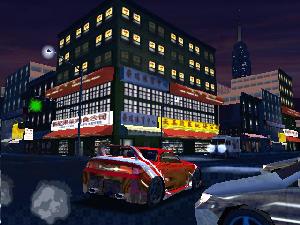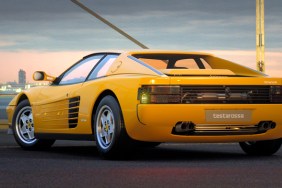It’s Midnight Madness!
It seems many developers think that hairpin turns and infallible CPU-controlled drivers are what make a really good driving game. Well, they’re wrong.
Any racer worth his weight in spare tires remembers the kick-ass Wipeout
series for the original PSX. Those are some great games. The one big problem,
though, is that the tracks suffer from too many 90 and 45-degree turns and the
non-player vehicles all drive in a single file line, never making a single mistake.
This is infuriating. I don’t want to be the oddball out, always bumping into
something while the computer drives as smooth as Barry
White on Valetine’s Day. I want to relish in the misfortune of my computer-controlled
opponents.
Enter Angel Studios’ Midnight Club, Playstation 2’s answer to the PC’s
Midtown Madness series of
games. In fact, Angel is the same developer that we have to thank for bringing
us those wonderful PC racers. But the PS2 is a different beast, and Midnight
Club offers a less than wonderful race.
Following in the tread marks of Midtown
Madness 2, Midnight Club bestows two huge, incredibly detailed metropolises:
London and New York. Neon lights, cabbies, newspaper stands, pedestrians and
often heavy traffic are but a few of the many obstacles and hazards that drivers
will face while blazing down a New York street at 90MPH. These obstacles allow
an impressive amount of road interaction…and I love me some road interaction.
And yes, you can hit the pedestrians.
One of the first things you’ll notice about Midnight Club is the lack
of any kind of story-tied FMV. Sure, there’s a brief opening sequence, but nothing
directly pertaining to the theme of the game, which is a midnight club of drivers
who compete against one another in a quest to become the ultimate nighttime
driving champion.
FMV doesn’t make or break a game, but this is the DVD enabled Playstation 2. How come I’m not witnessing any high-quality cutscenes, live or animated? Just something to make me feel like this is truly ‘next-generation’ and not simply a fancy Playstation 1 street racer.
Midnight Club offers two major modes of play: Arcade and Career mode.
In Arcade mode racers are given the option of participating in four types of
races. Most gamers are familiar with Cruise, Head-to-Head and Capture the Flag.
Waypoint is by far the most intriguing option. This can be likened to checkpoint
style races, the major differences being that you can hit the checkpoints in
any order. The first person to reach all the checkpoints and get to the final
destination wins. The non-linearity of the waypoint system is pretty cool –
I never liked the idea of having to follow a prescribed route within a city.
Career mode is a much more systematic use of these same four offerings. Before
you can do a Waypoint race, you must cruise the city looking for potential competition.
This is a nice way to incorporate the cruise feature into the more competetive
gameplay of Career mode.
 Midnight
Midnight
Club mimics the gameplay of the Midtown Madness series. The relatively
easy arcade control makes a welcome appearance. Novices and veteran gamers alike
will find the responsive steering a snap. The physics of the game follow the
tradition of the PSX classic Driver;
not too real, not too fake. It’s a nice balance.
Sadly, the fun factor for Midtown Madness reaches its zenith when the
game is played multiplayer, and the Playstation 2 has no online capabilities
as of yet. Though Midnight Club does provide an adequate 2-player split
screen feature, the enhanced graphics and the number of moving objects on screen
make for a highly congested TV screen. The link option would have helped tremendously
here, but Midnight Club doesn’t support it. Giving credit where credit
is due, the two-player split for Capture the Flag mode is pretty fun, despite
the limited viewing area.
This game isn’t called Midnight Club because of its love for the diurnal.
No, the title contains the time of the witching hour for a reason. In Career
mode, all races take place at night, presumably midnight. You can set varying
weather conditions like rain, cloud and fog. The wet nighttime streets look
particularly good as car headlights reflect off the damp, glimmering concrete.
There are four different time settings in Arcade mode, ranging from dusk until
dawn. The problem is that all these settings look exactly like the nighttime
setting. The bland, boring textures don’t help this matter one iota. Apparently,
the people over at Angel Studios must really like the shade of gray, because
it permeates this entire game like a storm cloud. Buildings are gray, streets
are gray, even the sky has a gray tint with white speckles that I assume are
meant to be stars. The whole night sky more resembles a well-used sneeze guard
at your local Sizzler’s salad bar. This just isn’t the graphical marvel I was
hoping for.
Ultimately, Midnight Club falls a few memory cards short of being a
good next-generation game. While offering a decent helping of fun, the bland
textures and ubiquitous gameplay make for a somewhat unexciting PS2 start.

-
Huge, detailed cities
-
Two-player Capture the flag is fun
-
You can hit the pedestrians!
-
Terrible textures
-
Overly familiar gameplay
-
No FMV, no story







